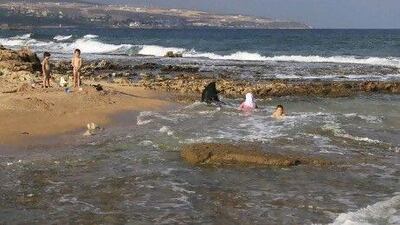Rich in history and culture, the Levant has so far been exempt from the vast hydrocarbon wealth that defines the Middle East in the eyes of the rest of the world.
What's the alternative?:
Energy Join The National as it explores alternative to fossil fuels. Learn more
Bordering countries with huge reserves of oil and gas, the states on the eastern shore of the Mediterranean have long relied on imports to supply their fossil-fuel-based power sector.
Things are about to change. Between 2009 and last year, a string of discoveries were made in the Levant Basin: the Dalit, Tamar and the Leviathan gas reservoirs. The Leviathan reservoir is estimated to hold 16 trillion cubic metres of natural gas, making it the biggest offshore gas discovery of the past decade.
Located mainly in deep waters, Levant hydrocarbons are hard to access, but the statistics are impressive. The US Geological Survey estimates the Levant Basin holds reserves of 120 trillion cu metres, about half of the gas reserves of the US, as well as 1.7 billion barrels of oil, as much as the adjacent Nile Delta Basin. The smaller Tamar field alone could fuel Israel's power plants for the next 20 years.
Israel claims production rights to the fields. Gas is becoming an increasingly important fuel, with predictions that it will account for 70 per cent of all electricity produced in the country by 2020.
At present, gas makes up about a third of all feedstock for power generation in Israel, but 40 per cent of this is imported from Egypt. The deal, signed under Hosni Mubarak, the former Egyptian president, is highly unpopular in Egypt because of allegations that the gas is sold below market price by corrupt officials of the old regime.
As a consequence, the Egyptian supply is far from secure. Last week, the pipeline linking the two countries was attacked for a sixth time since Mr Mubarak was toppled in February.
The attacks are only one part of a geopolitical nexus that complicates the already technologically challenging undertaking of extracting gas in deep waters. The Levant Basin covers about 83,000 square kilometres, and extends far beyond Israel's shores to the waters off the Lebanese, Syrian and Cypriot coasts.
"This gas is very important for the regional economies, and it has been found in just about the most difficult and conflicted place you could possibly have put it," says Robin Mills, the head of consulting at Manaar Energy Consulting in Dubai.
The key issue is that sea borders between the countries' have not been set, leading to competing claims. Lebanon insists that its exclusive economic zone, the offshore area in which it has sole rights to explore and produce, encompasses one third of the entire Levant Basin. This could lead to significant tension. Hassan Nasrallah, the leader of Hizbollah, has already threatened to attack Israeli gas installations he claims would "steal" Lebanon's natural resources.
Israel has secured an agreement on maritime borders with Cyprus, while relations with Greece are also good. In contrast, its relationship with Turkey, which effectively controls a part of Cyprus after its invasion of the north in 1974, is at a low ebb, as recently demonstrated by the Israeli interception of a flotilla bearing aid from Istanbul to the Gaza Strip.
Turkey has already asserted that the self-declared Turkish Republic of Northern Cyprus has the same rights to gas reserves in the Levant as its neighbour on the south of the island, and has threatened to send warships into the Levant Basin to support this claim. For now, Syria is too preoccupied with its vicious internal conflict to be staking any claims over offshore territories.
"Tamar and Leviathan are unfortunately not the catalyst for regional peace and prosperity but, rather, more fuel in an already combustible mix," Mr Mills fears.
Nevertheless, Israel is pressing ahead with the development of the fields and is envisaging production at Leviathan by 2017. With gas flowing out of the field, the country should have excess capacity of between 5 billion and 10 billion cu metres available to export, according to a report by UBS.
The situation is different in Lebanon, where the requisite regulatory framework has barely been put in place, the technological know-how is absent, and international oil companies will be hesitant to invest until the maritime border dispute has been resolved.
In spite of Lebanon's poverty in natural resources, Israel does not have an export market at its doorstep. With the exception of Jordan, none of its neighbours are likely to buy Israeli gas, forcing it to look further afield. The strained relationship with the Turks precludes a gas pipeline to Europe via Cyprus or Turkey, believes Mr Mills. That leaves little choice but to invest in liquefied natural gas (LNG) facilities that allow for the transportation of gas in tanker ships.
This will lead to disappointment in Europe, which is desperate to diversify its supply of gas to reduce its dependence on Russian imports. Without a pipeline, Europe will face strong competition from other parts of the world.
"If the gas is exported by pipeline, then Europe is more or less guaranteed certain amounts. If it is exported as LNG, then basically Europe would be competing with the Asian market, and very strong Chinese demand," says Justin Dargin, an energy expert at Harvard University.
Israel, in contrast, will probably never provide real competition to the world's largest LNG exporter, Qatar. While the Levant's gas finds are significant, they are a drop in the ocean compared to the estimated 900 trillion cu metres of gas in Qatar's vast North Field reservoir.

